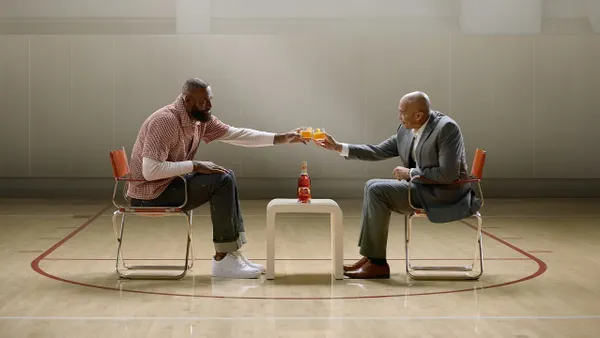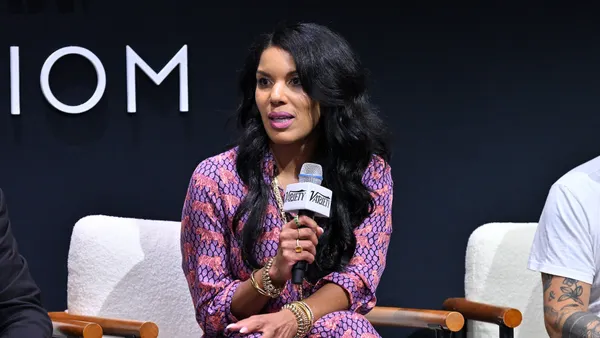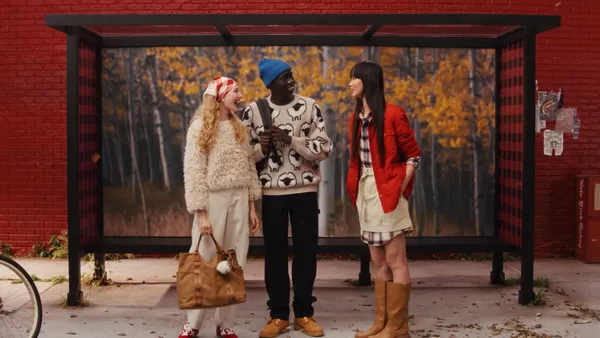Nike's "Just Do It" slogan first launched in 1988, with a commercial featuring 80-year-old Walt Stack jogging across the Golden Gate Bridge. "I run 17 miles every morning. People ask me how I keep my teeth from chattering in the wintertime," he said, adding cheekily, "I leave 'em in my locker."
Nike has retained the slogan and the defiant spirit of that first ad, but times have changed.
To celebrate the 30th anniversary of "Just Do It" — which has now carried the brand through numerous iterations of its performance wear and sales that last year reached $36.4 billion — Nike has turned to the most defiant athlete of the moment, Colin Kaepernick, to be the face of its signature campaign.
If that sounds crazy, that happens to be the theme of the first commercial, "Dream Crazy," which Nike released on Wednesday and plans to debut during Thursday's National Football League season opener. Kaepernick's tagline within the campaign is, "Believe in something, even if it means sacrificing everything."
And that's where the risk lies for Nike's brand. Kaepernick has been on Nike's ad roster since 2011, but this pick isn't a reflection of the former quarterback's athletic prowess. Rather, it spotlights the kneeling campaign he undertook during the 2016 season to protest police brutality against people of color, during the pregame singing of the national anthem. His actions have possibly cost him his job and certainly polarized football fans. And the wreckage of the controversy seems unlikely to be contained, in light of the way President Donald Trump continues to fan its flames.
The gamble
Nike appears to be comfortable making a trade: older, white male shoppers — maybe Trump voters — for younger, more diverse, more urban, wealthier — and likely more progressive — ones. That's not something that brands usually do in such a stark way.
Michael Jordan is widely credited with saying, "Republicans buy sneakers too." Though it's unlikely that he ever actually said it, the sentiment — which serves as an explainer of why Jordan has often declined to wade into political matters — is illustrative of the prevailing marketing notion of the 90s: that safe, broad-based campaigns are wise campaigns. These days, however, younger consumers are looking for brands to pick sides, in an era where high-key political polarization and racial matters have touched the sports world in a high-profile way.
"While taking a stand can be unpopular with some, businesses that are taking a stand, like Nike, Dick's, Levi's and many others, are looking to the future," Meredith Ferguson, managing director of DoSomething Strategic, the data-driven consultancy arm of social change organization DoSomething.org, told Retail Dive in an email. "They're appealing to their consumer 30 years from now, not the one they've had for the last 30 years."
Nike loses
But the social media furor that erupted when Kaepernick revealed the new campaign on Labor Day demonstrates how polarizing it could be. Nike's social mentions jumped 1,400% on Tuesday to 2.7 million after Kaepernick's tweet. Not all of that was positive, and it seems clear that Nike has lost some customers. That strikes many as imprudent, particularly in a retail segment that has been losing share to more casual street styles, and Nike shares tumbled 3% Tuesday after the market opened, the company's worst one-day decline since April 2, according to FactSet analysis cited by MarketWatch.
"While Nike has been doing relatively well in a sports market that is under pressure, it cannot afford to make bad decisions," warned GlobalData Retail Managing Director Neil Saunders in comments emailed to Retail Dive. "Demand for sports products and footwear is much softer than it was a few years ago and competition from rivals has increased. Anything which has the potential to damage market share, such as overtly political campaigns, should be avoided."
It doesn't help that Nike is grappling with an internal sexual harassment controversy that has sparked an exodus of several top executives and imperiled its tactic to appeal more to women.
The kneeling protest is among the most fraught controversies of our time, according to data from Morning Consult, which found that, among Trump voters, wading into the issue is potentially more hurtful to a brand (58%) than being negative about Trump himself (55%). And 71% of Trump voters said they're less likely to buy from a company that supports kneeling during the national anthem, according to that report.
Millennials were closer to an even split, according to that research, with 37% saying they'd look favorably on a brand that supported kneeling, 34% saying they'd see it unfavorably and 29% saying it didn't matter or they didn't know. Meanwhile, some activists don't think that Nike has gone far enough, demanding on Care2.org that the brand exit its newly inked 10-year partnership with the NFL until the league agrees to lift its new kneeling ban.
Nike has been both a sports gear and advertising juggernaut for decades, but its choice of Kaepernick led some observers, foremost among them Trump, to question its strategy. "Nike is getting absolutely killed with anger and boycotts," the president tweeted on Wednesday as the buzz continued. "I wonder if they had any idea that it would be this way?"
Just like the NFL, whose ratings have gone WAY DOWN, Nike is getting absolutely killed with anger and boycotts. I wonder if they had any idea that it would be this way? As far as the NFL is concerned, I just find it hard to watch, and always will, until they stand for the FLAG!
— Donald J. Trump (@realDonaldTrump) September 5, 2018
Nike wins
But Nike knows what it's doing, and has flirted with controversy before, according to Jeff Greenfield, COO of C3 Metrics, a cross-channel advertising measurement and accountability firm. "Nike is known to base decisions on research and economics," he told Retail Dive in an email. "In 2003, when many other brands dropped Kobe Bryant amidst controversy, Nike commissioned a massive research study with core buyers in urban America, and ultimately decided to keep its endorsement contract, recognizing the long-term opportunity."
Similarly, Nike's core customers are aligned with Kaepernick's views on prejudice, especially its impact on young African-Americans, and that explains why Nike is not only renewing his contract but also "leveraging that emotional view for their core demographic," Greenfield said.
Matt Powell, NPD group vice president and senior industry advisor of sports, also believes that Nike has done the math. "I think consumers want brands to share their values and to take stands on social issues," he told Retail Dive in an email. "Two thirds of people wearing Nike are under 35, so this campaign aligns with the bulk of their consumers. Nike may lose some consumers over this, but they will likely gain more."
Furthermore, the flurry on social media, even with so much of it negative, reflects brand attention that money can't buy, according to Eunkyu Lee, professor of marketing at Syracuse University's Whitman School of Management.
"Nike is reaping the benefits of having millions of conversations happening about its brand," he told Retail Dive in an email. "With the advent of social media, brands can no longer control their messages in the way they once could. So, it's best for companies to ride the wave, as Nike is doing, rather than try to control the wave, which is futile."
Nor should it, he also said, noting that "Nike's unwavering support for its athletes resonates with its younger, diverse demographic, which likes to see brands take stands for what they believe in."
The range of millennial interest in social justice reads like a laundry list of what some brands might think they should avoid: LGBTQ, sustainability, women's issues, free press and individual expression, according to Jane Hali, CEO of Jane Hali & Associates. "But this generation wants companies to take a stand on the national conversations," she told Retail Dive in an email. "The backing of this athlete follows this trend of free expression and speech. [Nike] is also known for being loyal to its athletes."
The numbers also shift when Nike's base is under the microscope. Nearly half (46%) of recent Nike customers have a favorable view of Kaepernick and just 23% don't, according to data from research firm YouGov. A great majority (78%) of Nike customers appreciate companies with a moral message, 10 percentage points more than U.S. adults in general (68%), and 65% of Nike customers like brands that are willing to get involved in societal issues, compared to just 45% of the general public.
Just Do It
That's quite a majority, and a sign that bold brand action may be called for not in spite of the country's divided politics, but because of it.
Kaepernick isn't the first sports figure to become infamous for risking his career for his beliefs. Muhammad Ali, who died two years ago and was revered as one of the nation's most celebrated sports icons and activists, years ago was stripped of his Olympic medals and exiled from boxing for a year after refusing to fight in the Vietnam War.
Nike would have jumped at the chance to sign Ali to its "Just Do It" campaign, too, according to New York University marketing professor Scott Galloway, who in a video on Wednesday called the Nike-Kaepernick tie-up "the gangster marketing move of 2018."
"We don't look favorably on people because of their beliefs, we look favorably on them because of their convictions, their willingness to sacrifice," he also said, predicting a long-term boon to shareholders in light of the move. "And history is going to look back on Mr. Kaepernick very favorably ."
But if history is to look favorably on Nike, it must be sure to rise above its own brand considerations, according to Christopher Gilbert, an ethics expert with NobleEdge Consulting and author of There's No Right Way To Do the Wrong Thing. "Nike has never been worried about taking sides. Their entire brand image is built on apparel that fits both an active lifestyle and bold, personal statements," he told Retail Dive in an email.
What Nike faces, then, is not so much whether it should or shouldn't take sides on the kneeling issue, but, rather, whether "Nike is encouraging the conversation and freedom of speech, or if it's making money off of furor and dissent," according to Gilbert.
"If it's the former, they ought to be doing a lot more to accompany that important national conversation," he said. "Making money is perfectly ethical. How you make it and what you do with it raise the moral questions. Can Nike add to our national discussion, or are they content to only profit off of it?"














